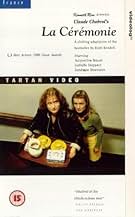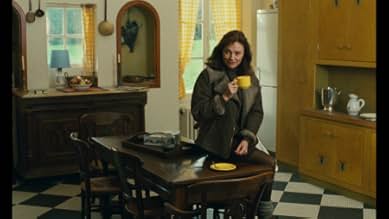IMDb रेटिंग
7.5/10
15 हज़ार
आपकी रेटिंग
एक अमीर ग्रामीण इलाकों के परिवार के लिए एक नई काम पर रखी हुई नौकरानी एक पोस्ट-ऑफिस क्लर्क से दोस्ती करती है जो उसे अपने नियोक्ताओं के खिलाफ विद्रोह करने के लिए प्रोत्साहित करती है.एक अमीर ग्रामीण इलाकों के परिवार के लिए एक नई काम पर रखी हुई नौकरानी एक पोस्ट-ऑफिस क्लर्क से दोस्ती करती है जो उसे अपने नियोक्ताओं के खिलाफ विद्रोह करने के लिए प्रोत्साहित करती है.एक अमीर ग्रामीण इलाकों के परिवार के लिए एक नई काम पर रखी हुई नौकरानी एक पोस्ट-ऑफिस क्लर्क से दोस्ती करती है जो उसे अपने नियोक्ताओं के खिलाफ विद्रोह करने के लिए प्रोत्साहित करती है.
- पुरस्कार
- 9 जीत और कुल 11 नामांकन
फ़ीचर्ड समीक्षाएं
I love Sandrine Bonnaire. Not love her in the "sell my possessions and move to Paris" love her, but love her in movies. In this movie especially. Every second she is on the screen, I was riveted to her. Her somewhat jerky and stiff physical mannerisms, her plain but beautiful face. And even though from the start we sense that her character is odd, creepy even, we can also feel her almost childlike panic and pain early on when we learn she can't read. It's enormously moving, and it creates a sympathetic bond with her that complicates how we view the events that follow. I just love her, and that probably clouded my overall estimation of the film. That's not to say the film is otherwise weak. It's not. The exploration into the class conflict between the rich and their help was excellent. And so was the portrayal of the sociopathic personality, shifting from sweet smiles to cold-bloodedness in a process devoid of emotion. Chilling, especially so when the sociopath is a waifish beauty. It's a very good movie made great by Sandrine Bonnaire's performance.
I watched this on video without reading the plot summary on the video box (or the user comments here), and I highly recommend seeing it without knowing too much about the plot. It is a gripping, Hitchcockesque character portrayal that slowly builds great tension and a sense of foreboding. Let all the clever foreshadowing pique your imagination; the ending will be that much more effective.
The upper-class owner of a gallery Catherine Lelievre (Jacqueline Bisset) hires the efficient and quiet maid Sophie Bonhomme (Sandrine Bonnaire) for working in the family manor in the countryside of France. Her husband Georges Lelievre (Jean-Pierre Cassel), who is an opera lover, her daughter Melinda (Virginie Ledoyen) and her teenage son Gilles (Valentin Merlet) welcome Sophie and appreciate her work. Soon Sophie befriends the postmistress Jeanne (Isabelle Huppert), who is a social outcast, and she encourages Sophie to rebel against her employers, but the maid stays submissive. However, Sophie is ashamed of a secret and feels uncomfortable in many situations, finding a way to hide her secret. When Georges tells to Sophie that he does not want Jeanne in his house, Sophie stands up against him. Melinda discovers her secret and Sophie blackmails her, but Melinda tells her parents what has happened. Georges fires Sophie and she returns to the house later with Jeanne on the rampage with tragic consequences.
"La Cérémonie" is one of the best films by Claude Chabrol and it is still impressive after watching many years after the release. The poignant story of class conflict, alienation and even evilness of two outcast working-class women stays in the mind of the viewer since it might happen to anyone that has a maid at home. The unexpected violent conclusion is probably the source of inspiration for Michael Haneke's "Funny Games" (1997). It is impossible to the viewer to be not affected by the despicable and cruel behavior of the repressed Sophie and the envious Jeanne. My vote is nine.
Title (Brazil): "Mulheres Diabólicas" ("Evil Women")
Note: On 21 April 1999, I saw this film again.
Note On 08 May 2017, I saw this film again.
Note: On 08 January 2025, I saw this film again.
"La Cérémonie" is one of the best films by Claude Chabrol and it is still impressive after watching many years after the release. The poignant story of class conflict, alienation and even evilness of two outcast working-class women stays in the mind of the viewer since it might happen to anyone that has a maid at home. The unexpected violent conclusion is probably the source of inspiration for Michael Haneke's "Funny Games" (1997). It is impossible to the viewer to be not affected by the despicable and cruel behavior of the repressed Sophie and the envious Jeanne. My vote is nine.
Title (Brazil): "Mulheres Diabólicas" ("Evil Women")
Note: On 21 April 1999, I saw this film again.
Note On 08 May 2017, I saw this film again.
Note: On 08 January 2025, I saw this film again.
Based on Ruth Rendell's Judgment in Stone, French auteur Claude Charbol transplanted this quintessentially English thriller about class and guilt to France, where he can fire more bullets at his favorite target - the French bourgeoisie. Without giving too much away, the story unfolds at a slow pace to reveal the class divisions and complex psychological issues that drive the characters' motivations. Centring on an illiterate maid, Sophie, who goes to desperate lengths to hide her "disability" from her employers, the wealthy Lelievre family, she eventually strikes a bond with the local postmistress who has mysterious grudge against her friend's employers. This film provided Chabrol with plenty of opportunities to criticize the disaffected bonhomie of the Levlievre family, but at times his presentation of some members of the Levlievres actually enlists our sympathy and therefore strikes a blow to the validity of his critique of French bourgeoisie values. Perhaps this was his intent to create more ambiguity than most psychological thrillers in this genre would allow. It's worth watching for the climax alone which has a delicious twist worthy of a mass-market Hollywood sequel.
10EdgarST
I don't know much about Claude Chabrol's cinema. I've seen seven or eight of his dozens of films, but I remember them quite well, especially "Violette Nozière", "Le boucher" and "La rupture." Many years after these, "La cérémonie" is a serene work, the construction of a mature man who avoids making artificial judgments or explaining motivations of his characters, and tending traps to his audiences to keep them interested in what he's narrating. In an economic way, with well-chosen details he gives us everything needed in a story that deals with psychological disturbances and profound social disparity. I do not see this movie as a thriller nor do I see the connection with Alfred Hitchcock. While Hitchcock could almost ruin his forays into psychological landscapes (like Simon Oakland explaining Norman Bates' behavior in "Psycho" or placing clues that led to nowhere) and very rarely treated social issues, Chabrol prevents from recurring to psychological clichés and gives us subtle gestures to illustrate the "class struggle": the way the rich daughter returns the handkerchief to the post-office clerk after cleaning her filthy hands; the way the post-office clerk throws back an envelope to the bourgeois father. A few times Chabrol is not so subtle and he shows tension even between persons of the same class: the way the poor maid and the post-office clerk despise the miserly charity of an old Catholic couple, the way the rich father protests when giving his son a ride to school... Using this strategy, all the portraits are compassionate: the members of the rich family seem as pleasant as the two poor women when they share the little they have. When the climax arrives -the daughter of the bourgeois family discovers (part of) the maid's secret and, in return, the maid reveals she also knows something about the young woman- there is little else Chabrol can add, but only guide us to the conclusion. Maybe it is a much too obvious cut from the two women with no food at home, to the dinner table where the rich family finished a tasty meal. But that's all we need, in case we want an explanation of the way the two women act in the last scenes. All the elements are there for us to find answers or make interpretations if we want to do so. Not too many filmmakers today treat audiences as intelligent human beings and invite them to participate in the creative process adding the absent information, with the benefit of more than a century of cinematic tradition and –if we care- reflections on the way things are today in imbalanced societies. When "La cérémonie" was over, I was very pleased: not only did I watch a movie directed with brains, but I felt treated with respect by Claude Chabrol. Not frequent in much of today's cinema, a respectful film has great merit.
क्या आपको पता है
- ट्रिवियाThe author Ruth Rendell has said that Claude Chabrol's version of her novel "A Judgement in Stone" is one of the few film adaptations of her work that she is happy with.
- भाव
Georges Lelievre: [referring, respectively, to Sophie the illiterate maid and Jeanne the nosy postal clerk] What a pair: one can't read at all, and the other reads our mail.
- कनेक्शनFeatured in Isabelle Huppert: Message personnel (2020)
- साउंडट्रैकCello Symphony
Composed by Benjamin Britten
टॉप पसंद
रेटिंग देने के लिए साइन-इन करें और वैयक्तिकृत सुझावों के लिए वॉचलिस्ट करें
विवरण
- रिलीज़ की तारीख़
- कंट्री ऑफ़ ओरिजिन
- आधिकारिक साइट
- भाषा
- इस रूप में भी जाना जाता है
- La Cérémonie
- फ़िल्माने की जगहें
- उत्पादन कंपनियां
- IMDbPro पर और कंपनी क्रेडिट देखें
बॉक्स ऑफ़िस
- US और कनाडा में सकल
- $8,73,196
- दुनिया भर में सकल
- $8,73,196
- चलने की अवधि1 घंटा 51 मिनट
- रंग
- ध्वनि मिश्रण
- पक्ष अनुपात
- 1.66 : 1
इस पेज में योगदान दें
किसी बदलाव का सुझाव दें या अनुपलब्ध कॉन्टेंट जोड़ें


![Bande-annonce [OV] देखें](https://m.media-amazon.com/images/M/MV5BNzliMDEwMzYtMjg1NS00Mjc1LTkwNDktMzc1MmJkNDJjZDIxXkEyXkFqcGdeQXRyYW5zY29kZS13b3JrZmxvdw@@._V1_QL75_UX500_CR0)




























